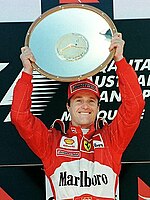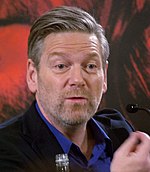Portal:Northern Ireland/Selected biography
Selected biography 1
Portal:Northern Ireland/Selected biography/1
Edmund "Eddie" Irvine, Jr. (b. 10 November 1965, Newtownards) is a former Formula One racing driver from Breezemount in Conlig.His professional racing career began in 1983 and he progressed to Formula Three racing in 1988, before moving on to Formula 3000 in 1989. He got his break in the top of the Formula racing series after he started racing for Jordan in the Formula 3000 series in 1990, and was subsequently picked up by the Jordan Formula One team in 1993. His reputation steadily increased in Formula One, eventually leading Ferrari to sign him in 1996.
1999 was his most successful season: He won four races and took the Drivers' Championship to the last race, finishing a close second to McLaren driver Mika Häkkinen. Having felt held back by Ferrari's support of his team mate Michael Schumacher, he left Ferrari to join the new Jaguar Racing team in 2000. He was the only driver to get Jaguar to the podium in the team's short F1 history; he achieved this feat twice.
Irvine is seen by many as a playboy in the mould of James Hunt, in contrast to the sport's modern stars, who are seen as staid and less flamboyant. Irvine is also remembered for his tendency to speak his mind, often to the irritation of some.
He was a millionaire through property investment before reaching Formula One. Outside of F1 Irvine is said to have built up a multi-million pound property portfolio, owning around 40 properties throughout the world.In April 2006, the Sunday Times Rich List named Irvine as the fifth richest person of Northern Ireland, having increased his personal fortune to approximately £160 million.
He owns Eddie Irvine Sports, a snooker, pool, kart racing, paintballing and football facility in Bangor.
He is now executive producer of a film being produced about Paddy Mayne and he has been linked to a future role at the Spyker MF1 Racing Formula One team.Selected biography 2
Portal:Northern Ireland/Selected biography/2
Clive Staples Lewis (29 November 1898–22 November 1963), commonly referred to as C. S. Lewis, and by his friends as Jack, was an Irish author and scholar of mixed Irish, English, and Welsh ancestry. Born into a Church of Ireland family in Belfast, he was resident in England throughout his adult life. Lewis is known for his work on medieval literature, for his Christian apologetics and for his fiction, especially the children’s series entitled The Chronicles of Narnia and his science fiction Space Trilogy. He was also a leading figure in an Oxford literary group called the Inklings.In 1916 Lewis won a scholarship to University College, Oxford during World War I. He enlisted in the British Army in 1917. He was commissioned as an officer in the third Battalion, Somerset Light Infantry. Lewis arrived at the front line in the Somme Valley in France on his nineteenth birthday.
Selected biography 3
Portal:Northern Ireland/Selected biography/3
William Thomson, 1st Baron Kelvin, GCVO, OM, PC, PRS FRSE (26 June 1824 – 17 December 1907) was an Irish-Scottish mathematical physicist, engineer, and outstanding leader in the physical sciences of the 19th century. He did important work in the mathematical analysis of electricity and thermodynamics, and did much to unify the emerging discipline of physics in its modern form. He is widely known for developing the Kelvin scale of absolute temperature measurement. The title Baron Kelvin was given in honour of his achievements, and named after the River Kelvin, which flowed past his university in Glasgow, Scotland.He also enjoyed a second career as a telegraph engineer and inventor, a career that propelled him into the public eye and ensured his wealth, fame and honour.
Selected biography 4
Portal:Northern Ireland/Selected biography/4
Kenneth Charles Branagh (born December 10 1960) is an Emmy Award-winning actor and film director.Branagh was born in Belfast, and educated at Grove Primary School. At the age of nine he relocated with his family to Reading in England. He received an honorary doctorate in Literature (D.Litt.) from Queen's University of Belfast in 1990.
The actor achieved some early measure of success in his native Northern Ireland for his role as the title character in the BBC's Play for Today series known as the Billy Plays, written by Graham Reid and set in Belfast.
He has worked on both stage and screen. He received initial acclaim in the UK for his stage performances, including the title role in Hamlet. More recently, in 2003, he starred in the National Theatre's well-received production of Edmond by David Mamet.
He is probably best known for his popular film adaptations of the works of William Shakespeare, beginning with Henry V in 1989 (for which he received Academy Award nominations both for his acting and directing) and including versions of Much Ado About Nothing (1993), Othello (1995), Love's Labour's Lost (2000), Hamlet for which he was nominated for best adapted screenplay, (1996) and As You Like It (2006). His 1996 version of Hamlet was the first time that the uncut text of the play (over 4 hours and 4000 lines long) had been made into a motion picture - all other film versions of the play have had several lines and, many times, entire scenes removed.
Branagh has been nominated for four Academy Awards, including the two for directing and acting in Henry V and another for the screenplay of Hamlet. He was awarded his Emmy for his performance in the film Conspiracy.Selected biography 5
Portal:Northern Ireland/Selected biography/5
David Ervine (21 July 1953 - 8 January 2007) was a Northern Irish politician and the leader of the Progressive Unionist Party.Raised in a Protestant working-class area of east Belfast, at 19 Ervine joined the Ulster Volunteer Force. Ervine was sentenced to eleven years imprisonment following an arrest in November 1974, for possession of explosives with intent to endanger life.
After much study and self-analysis whilst in jail, Ervine apparnetly emerged with the view that change through politics was preferable to terrorism. Released in 1980, he ran a newsagents' in Belfast for several years before taking up full-time politics. He stood in local council elections as a Progressive Unionist Party (PUP) candidate in 1985.
The PUP maintained links with the UVF, and Ervine is said to have played a pivotal role in bringing about the loyalist ceasefire of October 1994. He was part of a delegation to Downing Street in June 1996 that met then British Prime Minister John Major to discuss the loyalist ceasefire.
Ervine was considered to be one of the most progressive unionists in Northern Ireland politics. He had been a strong supporter of the Belfast Agreement. At a Labour Party meeting in 2001, then Northern Ireland Secretary, John Reid, described him as "one of the most eloquent politicians in Northern Ireland". Some of the less articulate of his opponents made references to him having swallowed a dictionary. Some saw Ervine as one of the few politicians actively engaged with conflict resolution.
In the Northern Ireland Assembly, he was seen as a Unionist sympathetic to the short term demands of Sinn Fein. He abstained against attempts by the Democratic Unionist Party (DUP) to exclude Sinn Fein from office in July 2000 and October 2001. In April 2001, he provoked a direct political attack from the DUP over him being the only Unionist to vote against a motion condemning the display of lilies commemorating the 1916 Easter Uprising at Parliament Buildings. He also expressed support for the right of Sinn Fein members to make speeches in Irish Gaelic on the floor of the Assembly. Later, political commentators noted how he sat next to Sinn Fein's Martin McGuinness at the funeral of Northern Ireland football legend George Best in December 2005 as a sign of how Northern Ireland had moved on.
In its final regular reports of Ervine's life in April and October 2006, the IMC concluded that it was satisfied the PUP leadership had taken appropriate action to de-escalate UVF's violence and criminality and withdrew its punitive recommendations. On 13 May 2006, it was announced that when the Northern Ireland Assembly reconvenes, Ervine would join the Ulster Unionist assembly group, whilst remaining leader of the Progressive Unionists. Under the d'Hondt formula used for allocating places on the Northern Ireland Executive this would entitle the Ulster Unionists to an additional place. On 11 September, 2006 Ms Bell announced that the Ulster Unionist Party Assembly Group did not have a headquarters, at least one party leader and a scheme for financial support thus did not qualify as a political party.
Ervine suffered a heart attack, a stroke and brain haemorrhage after attending a football match between his team, Glentoran, and Armagh City at The Oval in Belfast on Saturday 6 January 2007. He died on Monday 8 January 2007 and was buried in Roselawn Cemetery on January 12, after a funeral service in east Belfast attended by Mark Durkan, Gerry Adams, Peter Hain, Dermot Ahern, Hugh Orde and David Trimble amongst others.Selected biography 6
Portal:Northern Ireland/Selected biography/6
Edmund "Eddie" Irvine, Jr. (b. 10 November 1965, Newtownards) is a former Formula One racing driver from Breezemount in Conlig.His professional racing career began in 1983 and he progressed to Formula Three racing in 1988, before moving on to Formula 3000 in 1989. He got his break in the top of the Formula racing series after he started racing for Jordan in the Formula 3000 series in 1990, and was subsequently picked up by the Jordan Formula One team in 1993. His reputation steadily increased in Formula One, eventually leading Ferrari to sign him in 1996.
1999 was his most successful season: He won four races and took the Drivers' Championship to the last race, finishing a close second to McLaren driver Mika Häkkinen. Having felt held back by Ferrari's support of his team mate Michael Schumacher, he left Ferrari to join the new Jaguar Racing team in 2000. He was the only driver to get Jaguar to the podium in the team's short F1 history; he achieved this feat twice.
Irvine is seen by many as a playboy in the mould of James Hunt, in contrast to the sport's modern stars, who are seen as staid and less flamboyant. Irvine is also remembered for his tendency to speak his mind, often to the irritation of some.
He was a millionaire through property investment before reaching Formula One. Outside of F1 Irvine is said to have built up a multi-million pound property portfolio, owning around 40 properties throughout the world. In April 2006, the Sunday Times Rich List named Irvine as the fifth richest person of Northern Ireland, having increased his personal fortune to approximately £160 million.
He owns Eddie Irvine Sports, a snooker, pool, kart racing, paintballing and football facility in Bangor.
He is now executive producer of a film being produced about Paddy Mayne and he has been linked to a future role at the Spyker MF1 Racing Formula One team.



